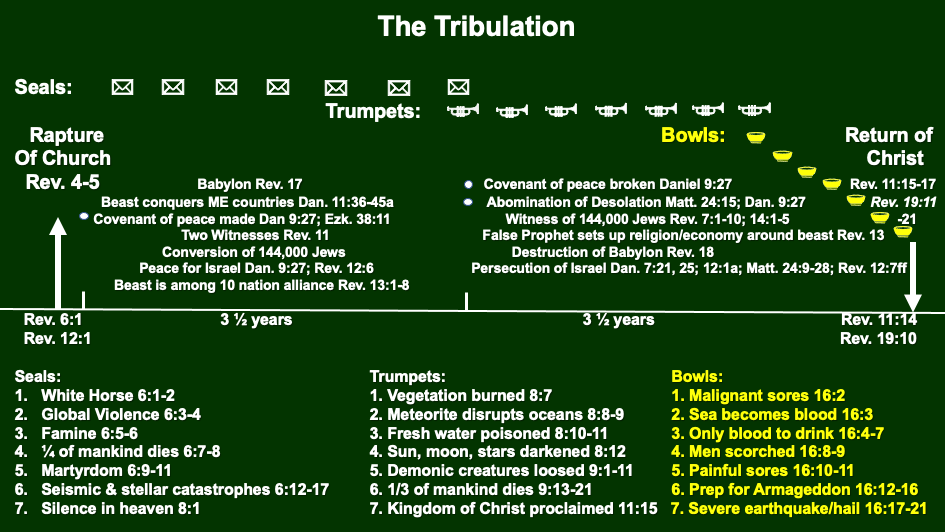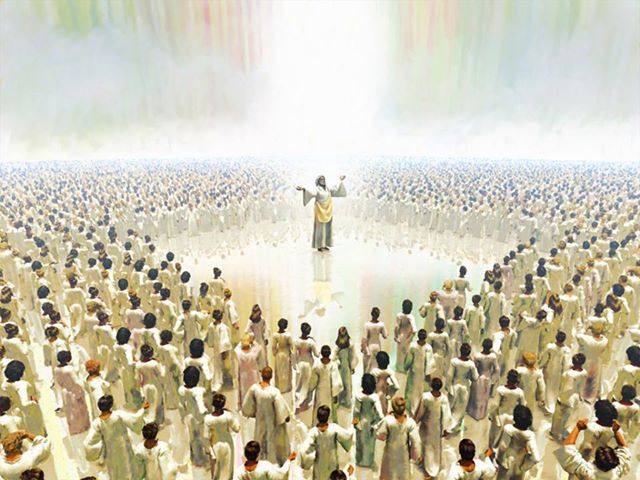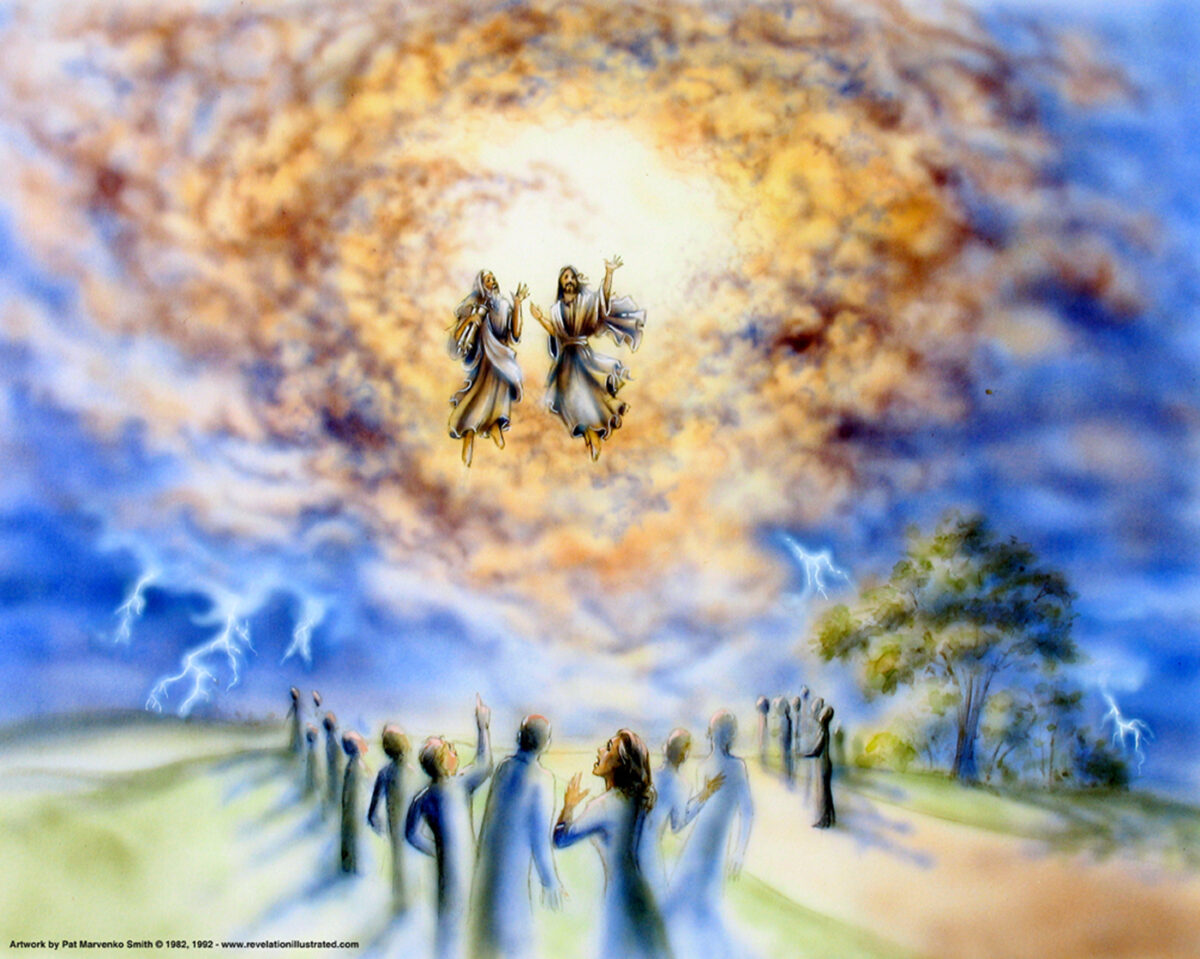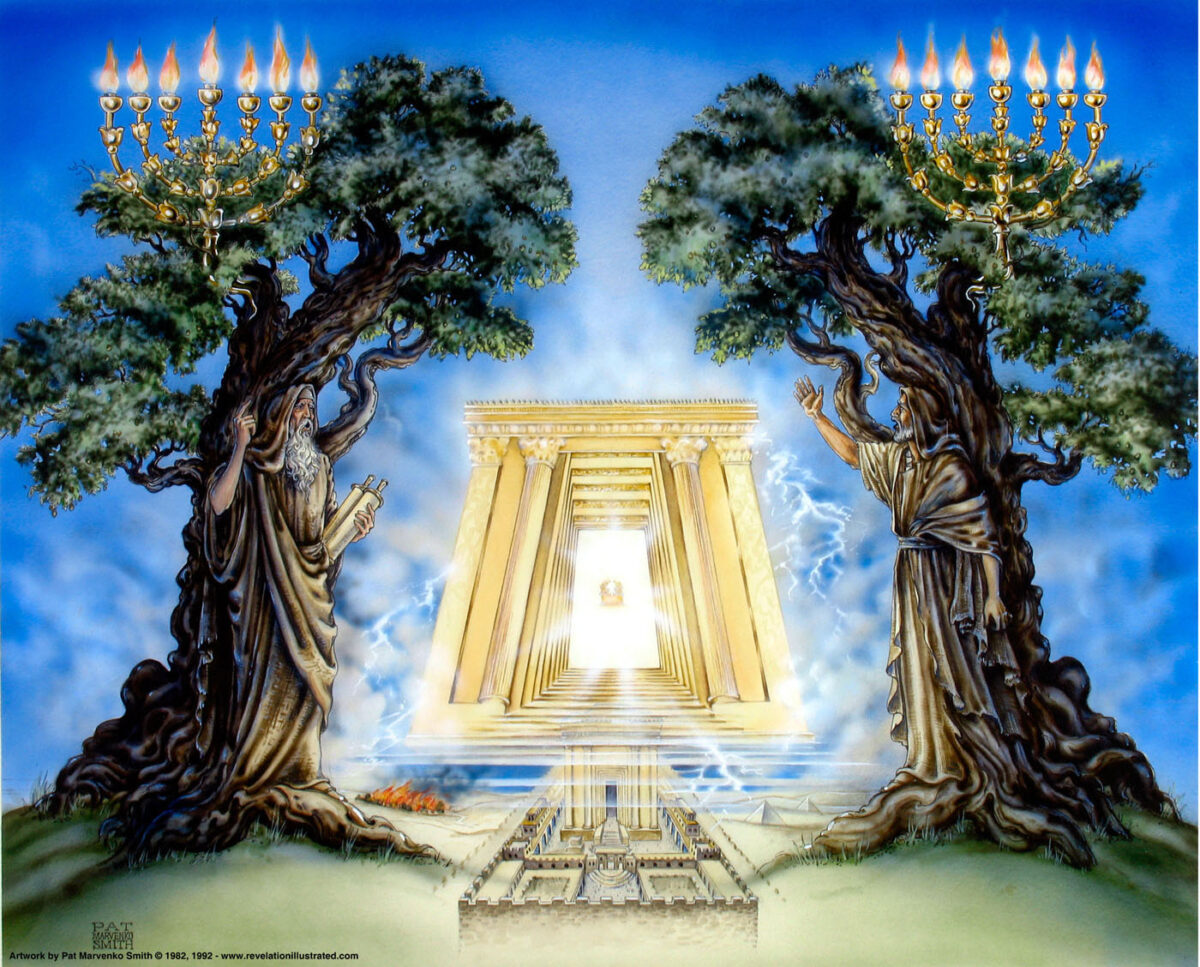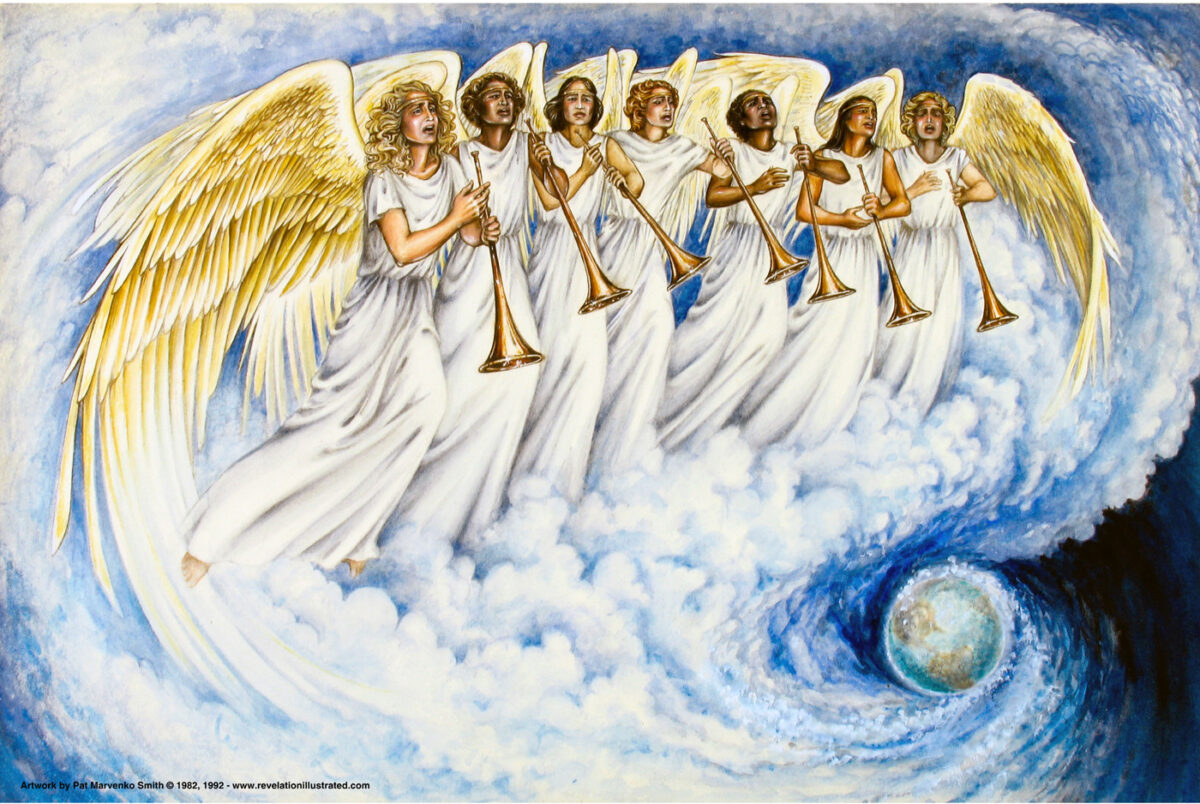“And I will give power to my two witnesses, and they will prophesy one thousand two hundred and sixty days, clothed in sackcloth.” Revelation 11:3
To introduce this next part of the parenthesis between the sixth and seventh trumpet judgments in Revelation 10:1-11:14, I want to quote Christian author and speaker, Chuck Swindoll:
“When they come to us in the form of bestselling novels, prime-time television, epic poems, or blockbuster movies, the heroes in classic stories tend to follow a common formula. They often are average individuals who endure and conquer overwhelming adversity at the cost of tremendous personal sacrifice in order to accomplish seemingly impossible goals. Think about some of the great films of the last couple of generations—Star Wars, Rocky, Titanic, Braveheart—and you get the picture. Such tales motivate us to overcome our weaknesses and accomplish great objectives. Enemies attack, obstacles are hurled into their path, and tragedies strike; but the heroes of great stories find a secret source of strength beyond themselves. Such strength enables them to vanquish even the most potent adversaries.
“When the people are real and the events are true, such stories inspire us all the more. Consider the brave men and women of the “Greatest Generation” who sacrificed their comfort and even their lives to defeat the overwhelming forces of evil during World War II. We remember individuals like Corrie ten Boom, who risked her life to help Jews escape the clutches of the Nazis. In fact, history—especially church history—is filled with moving stories of saints, mere men and women like you and me, who took a stand for Christ and paid the ultimate price for their courageous convictions. Though their flames were extinguished in their own dark generations, the light of their valor continues to burn brightly.
“The book of Revelation also presents us with the story of underdogs who stand against overpowering and intimidating forces. John himself stood strong under the persecution of the emperor Domitian (Revelation 1:9). Members of the early church courageously stood against trials and temptations (2:9-11). Now, in Revelation 11:3-14, we’ll encounter two end-times prophets, simply called the ‘two witnesses,’ who take a stand in the midst of the worst generation in human history.” 1
The apostle John was instructed to “prophesy again,” a second time regarding the seven-year Tribulation “about many peoples, nations, tongues, and kings” (10:11). This second survey of the seven-years Tribulation would focus on specific characters, including the two witnesses of Revelation 11 and their people, the Jews.To establish the context in which these two witnesses will minister, John writes, “Then I was given a reed like a measuring rod. And the angel stood, saying, ‘Rise and measure the temple of God, the altar, and those who worship there.’” (Revelation 11:1). John was instructed to use a “a reed like a measuring rod,” much like a modern yardstick, to “measure the temple of God, the altar, and those who worship there.”
This is a reference to the rebuilt temple of God by the Jews during the first half of the Tribulation period when God resumes dealing directly with the nation of Israel (11:1; cf. Daniel 9:27; 2 Thessalonians 2:4). This is important to understand from John’s perspective. After all, John had this vision around the year AD 96. Twenty-five years earlier, the Roman army had leveled the Jerusalem temple under the command of the Roman general, Titus. When John heard this angelic voice tell him to measure the temple, his first thought may have been, “Temple? What temple?” 2
However, John also knew that Old Testament prophecies, the Lord Jesus, and the apostle Paul all pointed to a future temple that would stand during the seventieth week of years known as the Tribulation (Daniel 9:27). Daniel 9:26-27 mentioned both the destruction of the “city and the sanctuary” which took place in 70 A.D. when the Roman army invaded Jerusalem (Daniel 9:26), and the ceasing (“He shall bring an end to sacrifice and offering”) of reestablished temple worship in Jerusalem at the midpoint of the seventieth “week” of years (Daniel 9:27; 12:11). 3
Jesus quoted Daniel’s prophetic words when He spoke of “the abomination of desolation” being set up in “the holy place” or temple in Judea (Matthew 24:15-16). The apostle Paul shared more details about the same future event when he described the coming of the Beast or Antichrist as “3 the man of sin is revealed, the son of perdition, 4 who opposes and exalts himself above all that is called God or that is worshiped, so that he sits as God in the temple of God, showing himself that he is God.” (2 Thessalonians 2:3-4). 4 What this means is that the Jewish temple will be rebuilt before the midpoint of the seven-years Tribulation when the Beast of Revelation or Antichrist will enter the temple and become the focal point of worship.
“Bible scholar Charles Ryrie suggests that the temple mentioned in Revelation 11:1-2 is ‘the temple that will be built during the Tribulation, in which Jewish worship will be carried on during the first part of that seven-year period and in which, at the midpoint, the man of sin will exalt himself to be worshiped.’” 5
Christian author and pastor Tony Evans writes, “To measure a structure or piece of property in Scripture is a means of laying claim to it. You measure it because you own it. In this case, then, God is laying claim to the Jewish temple in Jerusalem that will be rebuilt during the tribulation. Today a Muslim mosque known as the Dome of the Rock sits on the temple site. Orthodox Jews, however, pray daily for the return of the temple at the Western Wall—the one remaining structure from the ancient Jewish temple complex that sits beneath the Dome of the Rock.” 6
The angel told John to leave something out of his measurement. “But leave out the court which is outside the temple, and do not measure it, for it has been given to the Gentiles. And they will tread the holy city underfoot for forty-two months.” (Revelation 11:2). John is told to “leave out the court which is outside the temple” because it will be “given to the Gentiles” who “will tread the holy city underfoot for forty-two months” during the last 3 ½ years of the Tribulation period after the Beast or Antichrist breaks his covenant with Israel in the middle of the seventieth week of years and controls the temple court and the rest of Jerusalem (cf. Daniel 9:27; Matthew 24:15-22; Revelation 13:5).
This explains in part why John’s “stomach became bitter” when he received this revelation of future judgment from God (10:10). His own people, the Jews, would be under the oppressive direction of the Man of Sin who would severely persecute God’s people in Jerusalem during the last half of the seven-years Tribulation (cf. 2 Thessalonians 2:3-4; Daniel 7:25). Jerusalem had to be judged because it became spiritually corrupt like Sodom and Egypt in Old Testament days (cf. Revelation 11:8). 7
We learn two things from Revelation 11:1-2: “First, the worshipers at the temple will be far fewer in number than those left out. John was able to quickly measure those within, but those on the outside were too numerous to count. This serves as an important reminder that God can and does work out His plan through a remnant.
“Second, we see that God has set in advance a limit on the time during which the nations will be permitted to ‘tread under foot the holy city.’ The ‘forty-two months’ here likely refers to the second half of the Tribulation period, during which the future Antichrist and his false prophet will reign (see 13:5). As we’ll see in a moment, the end-times regime of that diabolical duo won’t come to full power until God has first delivered His last prophetic words through His own duo of divine spokesmen—the two witnesses.” 8
We also learn from verse 2 that God gives the Gentiles only what is “outside” while the inner reality of Israel’s worship and worshippers is protected by Him (this protection is symbolized by the measurement of the temple in verse 1). The true worship of God is protected at the same time the city (and by implication the temple), falls under the oppressive dominion of the Gentiles. 9
In contrast to the the “forty-two months” of Gentile domination during the last 3 ½ years of the Tribulation (11:2), John writes, “And I will give power to my two witnesses, and they will prophesy one thousand two hundred and sixty days, clothed in sackcloth.” (Revelation 11:3).
Who are these two witnesses? Many commentators believe they will be “Moses” and “Elijah” restored to life, since these men were prophets and performed the kinds of miracles these witnesses will perform (11:6). 10 In addition, they refer to Moses and Elijah appearing with Christ on the Mount of Transfiguration in a preview of His Second Coming to earth (Matthew 16:27-17:7; 2 Peter 1:16-18). 11 Other students of the Bible believe they will be “Enoch” and “Elijah,” since God took these men to heaven without dying. 12 Another reason some believe one of these witnesses will be Elijah is Malachi 4:5, which predicts that Elijah will return before the Messiah. 13 Some interpreters “who believe that this particular part of Revelation refers not to future events but to events that occurred in the first century have identified the two witnesses as Peter and Paul, James and John, or even two high priests killed by the Romans in AD 68!” 14
The bottom line is God does not reveal the identity of these two witnesses in the biblical text. What God does tell us is these “two witnesses…will prophesy” or communicate revealed truth from God “one thousand two hundred and sixty days” which would be 3 ½ years during the first half of the Tribulation period, resulting in the conversion of the 144,000 Jewish evangelists who will spread the “gospel of the kingdom” during the last half of the Tribulation period (11:3; cf. 7:1-10) to “all the nations” (cf. Matthew 24:14). The gospel of the kingdom refers to the good news of King Jesus returning to earth to set up His kingdom at the end of the Tribulation period (Revelation 19:11-21). Only those who believe in Christ will be able to enter His kingdom on earth (Matthew 18:3; 21:31-32; John 3:3-16).
The two witnesses “do not neglect the preaching of the cross, for Revelation 7:14 and Zechariah 13:7-9 indicate that the preaching of the gospel of the kingdom in the seventieth week is accompanied by the preaching of the cross. The message committed to the church is the message of grace. The church has no other message. The fact that the message announced is one of judgment, repentance, and preparation in view of the coming of the King indicates that the church must no longer be present, for no such message is committed to her.” 15
That this refers to the first half of the Tribulation period 16 is seen by comparing these two witnesses to “the two olive trees” of Zechariah 4:1-14, namely Joshua the high priest and Zerubbabel, the Jewish governor, who returned from captivity in Babylon to re-establish worship in Jerusalem (11:4; cf. Zechariah 3:1; 4:1-14). These two witnesses will not be able to re-establish worship in Jerusalem during the last half of the Tribulation because the Beast or Antichrist will put an end to sacrifices and persecute God’s people so that they will have to flee from Jerusalem (Matthew 24:15-22), so their ministry must take place during the first half of the Tribulation.
Keep in mind that after Jesus removes His church from the earth via the Rapture (Revelation 4:1-4; cf. I Thessalonians 1:10; 4:13-5:11), “not one saved person will be left on the earth. But this will change the very day it becomes true. Two men in Israel will be converted to Christ—apparently by direct, supernatural revelation (similar to Samuel in 1 Samuel 3 or Saul of Tarsus in Acts 9). They will become the first prophets of Israel (outside those of the early church) since John the Baptist and will be given power to perform miracles that will torment (cf. Rev 11:10) earth’s inhabitants. Their clothing of sackcloth will match their message that the Day of Judgment spoken of by the OT prophets (the Day of the Lord; cf. Isa 13:9; 34:8; Zeph 1:14-18; Zechariah 14) has arrived. They will also share the good news of the gospel so that the firstfruits of the Lamb—the 144,000—will be converted, and spread the gospel to the ends of the earth (Matt 24:14). However, the primary role of the two witnesses is clear: they will testify about the Creator who has begun to pour out His wrath on rebellious mankind.” 17
John gives us a few more details about these two men. “These are the two olive trees and the two lampstands standing before the Lord of the earth.” (Revelation 11:4). These two witnesses are compared to “two olive trees and… lampstands” because they are dependent on the oil of God’s Spirit to be the Lord’s light in a dark world as they speak the truth of God, Who controls the entire “earth.”
“And if anyone wants to harm them, fire proceeds from their mouth and devours their enemies. And if anyone wants to harm them, he must be killed in this manner.” (Revelation 11:5). “If anyone wants to harm” these two witnesses, and they will because of the judgments these witnesses bring upon the earth (cf. 11:6), the witnesses will be able to protect themselves with “fire” that “proceeds from their mouth and devours their enemies,” like what Elijah did (cf. 2 Kings 1:10-14).
Like Elijah (cf. I Kings 17:1, 7; 18:1), these two witnesses “have power to shut heaven, so that no rain falls in the days of their prophecy” (Revelation 11:6a). Also, the length of their ministry(“days of their prophesying”) will be the same as the drought that God sent during Elijah’s day (three and a half years – I Kings 17:1; 18:1; cf. Luke 4:25; James 5:17). Like Moses (Exodus 7:14-12:30), “they have power over waters to turn them to blood, and to strike the earth with all plagues, as often as they desire.” (Revelation 11:6b). The supernatural power of these two witnesses will exceed what Moses possessed in that they will be able “to strike the earth with all plagues, as often as they desire.” God used Moses to destroy Egypt with plagues (cf. Exodus 10:7), but these two servants of the Lord will be used to inflict devastation on the whole earth. 18
This will be the fifth period in history when God will enable a few people to do unusually spectacular signs and wonders in connection with delivering great amounts of new revelation. 19 The first four periods were:
1. The times of Moses and Joshua.
2. Of Elijah and Elisha.
3. Of Daniel and his three friends.
4. The times of Jesus Christ’s earthly ministry and that of His apostles.
Do you ever feel like you are the only person in your community that cares about the things of God? Do you think you are helpless to see transformation in your own life or in the lives of others? What Revelation 11:1-6 teaches us is that no matter how hopeless or helpless a situation may seem, God can change things for the better.
Even though there will be no believers remaining on the earth after the removal of the church at the time of the Rapture, God’s grace is seen when He provides His life-giving message during the most wicked time in human history. Through two witnesses He brings directly to faith in Christ, God will proclaim the gospel during the first half of the Tribulation period, resulting in the salvation of the 144,000 Jewish evangelists who will then evangelize all the nations during the last half of the Tribulation period (11:1-6; cf. 7:1-17; Matthew 24:14).
The “power” these two witnesses will receive from God comes from the same Holy Spirit Who indwells and empowers all who believe on the Lord Jesus Christ. The same Spirit that raised Jesus from the dead will empower God’s two witnesses during the first half of the Tribulation and is the same Holy Spirit that indwells all who believe in Jesus today. Just as God gave supernatural “power” to these two witnesses to proclaim His message to a wicked world (Revelation 11:3), so God gives Christians today the supernatural ability through His Holy Spirit to proclaim His truth to a secular and pluralistic world that does not want to hear the gospel of grace which exposes their sin and their need for a Savior (Acts 1:8). The key for Christians is to depend upon the Holy Spirit, not themselves. When we do that, all the glory belongs to God, not ourselves.
Swindoll writes, “The Bible is filled with examples of God using outcasts and underdogs to accomplish His will: David versus Goliath, Elijah versus the prophets of Baal, Gideon’s three hundred men versus thousands of Midianites, Esther versus Haman. Our God delights in turning the tables on the world’s mindset of ‘bigger is better’ and ‘only the strong survive.’ In a world that sees success and accomplishments as the ultimate standard for determining a person’s worth, it’s easy to forget that God often chooses the small over the large and a remnant over the masses.” 21
God will take two men during the darkest time in human history and use them to change the lives of 144,000 Jews whom God will use to spread the gospel around the world. Since God will do that, never underestimate what He can do through you at a time when you may feel all alone and unable to make a difference. God is able to provide for you and protect you as He did the two witnesses.
Prayer: Gracious Father, thank You for giving us a glimpse of Your magnificent grace during a time when the world deserved Your devastating judgments. After removing Your church from the earth, You could have wiped out every human being on earth with the outpouring of Your wrath. But because of Your grace, You directly brought two men to faith whose prophetic ministry would result in the salvation of 144,000 Jews who would preach the gospel to all the nations during the last half of the Tribulation period. When we feel alone and unable to make a difference in our declining world, Your Word reminds us that nothing is impossible with You, Lord. If You can use two men to change thousands of lives during the worst time in human history, You can use us to make a difference for Christ in our world today so all the glory belongs to You. Please help us never to forget that our strength comes from You alone. In Jesus’ name we pray. Amen.
ENDNOTES:
1. Charles R. Swindoll, Insights on Revelation (Swindoll’s Living Insights New Testament Commentary Book 15, Tyndale House Publishers, Inc., 2014 Kindle Edition), pg. 213.
2. Ibid., pg. 214.
3. Ibid.
4. Ibid.
5. Ibid.
6. Tony Evans, CSB Bibles by Holman, The Tony Evans Bible Commentary (B & H Publishing Group, Kindle Edition, 2019), pg. 2392.
7. Bob Vacendak; Robert Wilkin; J. Bond; Gary Derickson; Brad Doskocil; Zane Hodges; Dwight Hunt; Shawn Leach. The Grace New Testament Commentary: Revised Edition (Grace Evangelical Society, Kindle Edition, 2019), pg. 1536.
8. Swindoll, pg. 215.
9. Vacendak, pg. 1536.
10. Tom Constable, Notes on Revelation, 2017 Edition, pg. 125 cites J. B. Smith, A Revelation of Jesus Christ Edited by J. Otis Yoder (Scottdale, Pa: Herald Press, 1971), pg. 169; Merrill C. Tenney, Interpreting Revelation (Grand Rapids: Wm. B. Eerdmans Publishing Co., 1959), pg. 191 and William Barclay, The Revelation of John Vol. 2, The Daily Study Bible series, 2nd ed. (Edinburgh: Saint Andrew Press, 1964), pp. 86-87. 11. Mark Hitchcock, The End: A Complete Overview of Bible Prophecy and the End of Days (Carol Stream, IL: Tyndale House Publishers, Inc., 2012 Kindle Edition), pg. 348.
12. Constable, pg. 125 cites Joseph A. Seiss, The Apocalypse Charles C. Cook, 1900; reprint ed., (Grand Rapids: Zondervan Publishing House, 1973), pg. 244; and Thomas W. Mackay, “Early Christian Millenarianist Interpretation of the Two Witnesses in John’s Apoclaypse, 11:3-13.” In By Study and Also by Faith, pp. 252-65, 310. Edited by John M. Lundquist and Stephen D. Ricks. Salt Lake City: Deseret, 1990.
13. Constable, pg. 125 cites Robert H. Gundry, The Church and the Tribulation, Contemporary Evangelical Perspectives series (Grand Rapids: Zondervan Publishing House, Academic Books, 1973), pg. 94.
14. Swindoll, pg. 216 cites Gregory K. Beale, The Book of Revelation: A Commentary on the Greek Text, The New International Greek Testament Commentary series (Grand Rapids: Wm. B. Eerdmans Publishing Co., and Carlisle, England: Paternoster Press, 1999), pp. 572-573 and Grant R. Osborne, Revelation Verse by Verse, Osborne New Testament Commentaries (Bellingham WA: Lexham Press, 2016), pp. 417-418.
15. J. Dwight Pentecost, Things to Come (Zondervan Academic, 2010 Kindle Edition), pg. 217.
16. Swindoll, pg. 216 cites Charles C. Ryrie, The Ryrie Study Bible (1961), cf. Vacendak, pg. 1536.
17. Vacendak, pp. 1536-1537.
18. Ibid., pg. 1537.
19. Constable, pg. 127; Swindoll, pg. 217.
20. Swindoll, pg. 217. 21. Ibid., pg. 219.

